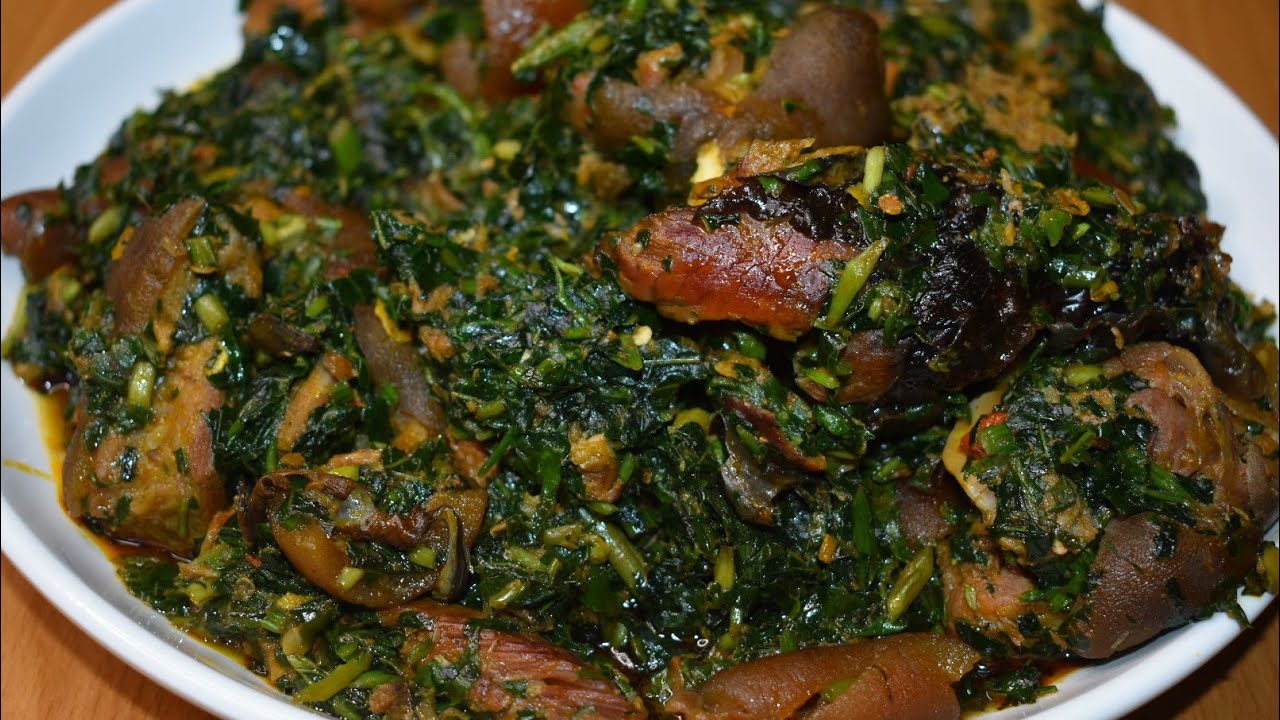Edikang Ikong is a hearty vegetable soup cooked with a combination of pumpkin leaves (Ugwu) and Malabar spinach (water leaf) cooked in a pepper mix with proteins, dried cod, cow skin cuts, and dried shrimp.

Like a lot of people, I was not a fan of everything green growing up, the thought that green veggies were anything but tasty messed with me. It took growing up to realize this is not true. In fact, with soups like Nigerian Edikang Ikong, the greener, the better!
The flavor of this pot of vegetable soup is thanks to its ingredients, the choice of protein, and the precision in the condiments.
Back in the day at the University of Calabar, my many exciting days included a trip to the popular Calabar kitchen just around the school library. I would always pick Edikang ikong or Egusi soup paired with my choice of swallow. I have been such a fan!
What is Edikang Soup?
Edikang Ikong is a vegetable soup variant owned by people from Southern Nigeria, specifically Akwa Ibom.
The vegetables, which are a combination of pumpkin leaves (Ugwu) and Malabar spinach (water leaf) are cooked in a pepper mix with proteins, dried cod, cow skin cuts, and dried shrimp.
Edikang Soup Ingredients

Apart from the vegetables used, the other important ingredient here is the choice of protein. The rich broth makes up the soupy part in which the chopped vegetables will cook.
Due to the unavailability of some of these vegetables where I live, I used regular spinach. I also added in some scent leaves to amplify the aroma of my soup. You can add chopped kale as part of your vegetable options.
As I mentioned earlier, your choice of meats is a very essential part of this soup. Assorted meats such as goat meat cuts, beef, beef tripe, and cow leg can be used, and if you are vegetarian, some portobello mushrooms will do the trick.
Your cooking time will vary based on your choice of protein as some meats take more time to soften. If there is one advantage to having a bowl of vegetable soup in your freezer, it is the variety it provides you.
In other words, it can be eaten alone, with a bowl of rice, some bread rolls, sadza, plantains, and yam chips, the options are endless.
Edikang Ikong Soup would pair nicely with Easy Sadza | Ugali |African Cornmeal.
Other Edikang Soup Ingredients

Other condiments used traditionally include periwinkles, deboned dry fish, dry shrimp, ground or whole crayfish, etc. The beauty of food is in the cook’s ability to substitute ingredients for either what is within reach or simply preferred taste.
Hence, use scallops, tiger shrimp, and flaked salmon, and play with it to your liking.
To enhance my Edikang Ikong, I also added:
1. Scotch Bonnets
This is optional and can be added according to your spice level. As a Yoruba girl (we love spice), I could not pass on a hint of spice in my Edikang Ikong.
2. Dried Cod
Popularly known as Okporoko in Nigeria, it is dried cod fish that is sold in most African/Caribbean stores. It is cooked with meats and adds a ton of flavor to the soup.
3. Palm Oil
This very nutritious oil is a common type of oil used in most soups of Nigerian origin. You can find this in your local store as well.
4. Dried Fish
There are different types of dried fish, the most popular kind when it comes to native Nigerian soups is the catfish. For this soup, the fish will need to be deboned.
5. Efinrin (Scent Leaves)
This is popularly called African basil. I garnished my Edikang Ikong with a handful of scent leaves, I found the dried leaves at the store. These do not need to be added in large amounts to prevent overpowering.
in conclusion, Edikang Ikong Soup is a popular Nigerian soup, specifically from the Efik tribe in Cross River State. It is a nutritious and flavorful soup made with a combination of two leafy vegetables, namely “Ukazi” (known as Okazi leaves or Afang leaves) and “Ugu” (known as Pumpkin leaves).
The name “Edikang Ikong” translates to “vegetable soup” in the Efik language.

